topic 03 Time
仁爱版英语七年级上册Unit4Topic3《Whattimeisitnow》说课稿
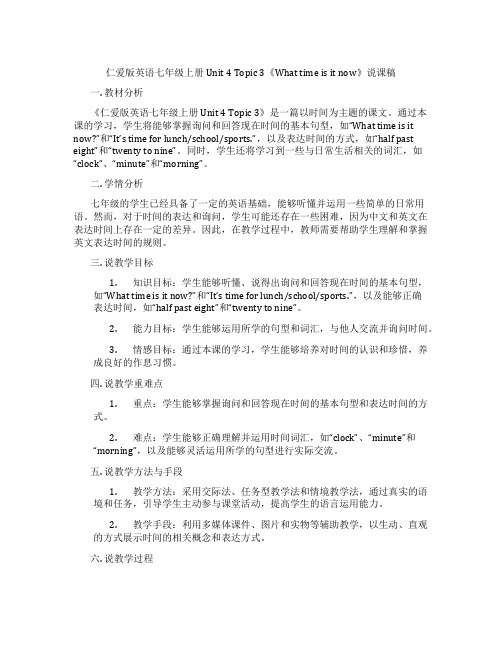
仁爱版英语七年级上册Unit 4 Topic 3《What time is it now》说课稿一. 教材分析《仁爱版英语七年级上册Unit 4 Topic 3》是一篇以时间为主题的课文。
通过本课的学习,学生将能够掌握询问和回答现在时间的基本句型,如“What time is it now?”和“It’s time for lunch/school/sports.”,以及表达时间的方式,如“half past eight”和“twenty to nine”。
同时,学生还将学习到一些与日常生活相关的词汇,如“clock”、“minute”和“morning”。
二. 学情分析七年级的学生已经具备了一定的英语基础,能够听懂并运用一些简单的日常用语。
然而,对于时间的表达和询问,学生可能还存在一些困难,因为中文和英文在表达时间上存在一定的差异。
因此,在教学过程中,教师需要帮助学生理解和掌握英文表达时间的规则。
三. 说教学目标1.知识目标:学生能够听懂、说得出询问和回答现在时间的基本句型,如“What time is it now?”和“It’s time for lunch/school/sports.”,以及能够正确表达时间,如“half past eight”和“twenty to nine”。
2.能力目标:学生能够运用所学的句型和词汇,与他人交流并询问时间。
3.情感目标:通过本课的学习,学生能够培养对时间的认识和珍惜,养成良好的作息习惯。
四. 说教学重难点1.重点:学生能够掌握询问和回答现在时间的基本句型和表达时间的方式。
2.难点:学生能够正确理解并运用时间词汇,如“clock”、“minute”和“morning”,以及能够灵活运用所学的句型进行实际交流。
五. 说教学方法与手段1.教学方法:采用交际法、任务型教学法和情境教学法,通过真实的语境和任务,引导学生主动参与课堂活动,提高学生的语言运用能力。
Unit 4 Topic 3 What time is it now

Unit 4 Topic 3 What time is it now?自测题一.英汉互译1. 在9 点2.4 点半3.7 点45 分4.在早晨/下午/晚上5.去动物园6. 回家7. 动物朋友们8.起床9. 吃早饭/午饭/晚饭10. 去上学11.在某人回家的路上12.在去……的路上13. 找到某人回家的路14.故事的结尾15. 让我帮助你16 在动物园里/在我家17.一个小时之后18.看猴子表演19.在早上大约十点钟20.帮助我妈妈做饭21.在家见朋友二.补全句子1. you have tomorrow?= you tomorrow? 你明天有空吗?2. 9 o’clock at my home. 咱们9 点在我家见面。
3 is it, please?= the , please? 请问现在几点了?4. go to the zoo. 现在是去动物园的时间了。
5.What your , Jane? J ane, 你最喜爱的动物是什么?6.What Baby Monkey? 小猴子发生了什么事?7.I can’t find 我找不到我回家的路。
8.It’s very you (to help me)帮助我,你真是太好了。
9.Thank you your help. =Thank you for me 非常感谢您的帮助。
10. 我们到了。
11. is the favorite food. 肉是老虎的最喜爱的食物。
12.It’s . 今天星期天。
13.Can we see ? Yes,we can. 我们在那儿能看见熊猫吗?是的,我们能。
14.They are so / / / 它们是如此的可爱/强壮/聪明/友好。
15.I have 我有一个快乐的一天。
16.They have long noses.它们长者长鼻子三.考察语法1.如何询问时间?2个2.如何表达时间?有两种方式:(一)直接读法7:05 7:15 7:307:45 7:50(二)间接读法7:05 7:15 7:307:45 7:50 8:003.时间前面的介词用at, 在句中充当时间状语。
仁爱版英语七年级下册7B Unit7_Topic3_SectionB_参考教案
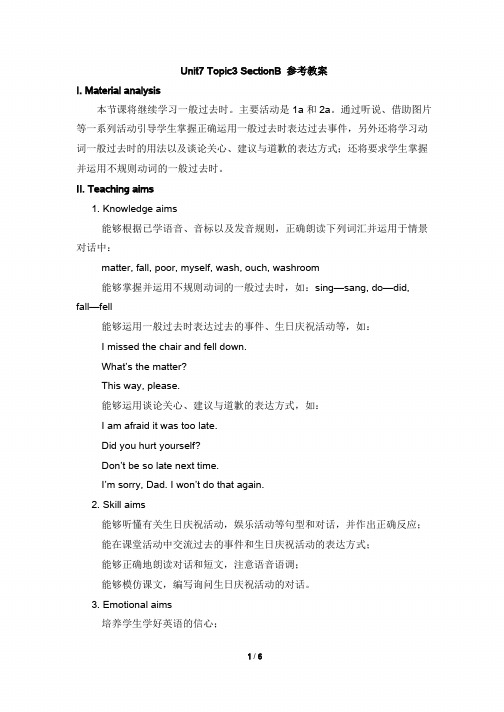
Unit7 Topic3 SectionB 参考教案Ⅰ. Material analysis本节课将继续学习一般过去时。
主要活动是1a 和2a。
通过听说、借助图片等一系列活动引导学生掌握正确运用一般过去时表达过去事件,另外还将学习动词一般过去时的用法以及谈论关心、建议与道歉的表达方式;还将要求学生掌握并运用不规则动词的一般过去时。
Ⅱ. Teaching aims1. Knowledge aims能够根据已学语音、音标以及发音规则,正确朗读下列词汇并运用于情景对话中:matter, fall, poor, myself, wash, ouch, washroom能够掌握并运用不规则动词的一般过去时,如:sing—sang, do—did, fall—fell能够运用一般过去时表达过去的事件、生日庆祝活动等,如:I missed the chair and fell down.What’s the matter?This way, please.能够运用谈论关心、建议与道歉的表达方式,如:I am afraid it was too late.Did you hurt yourself?Don’t be so late next time.I’m sorry, Dad. I won’t do that again.2. Skill aims能够听懂有关生日庆祝活动,娱乐活动等句型和对话,并作出正确反应;能在课堂活动中交流过去的事件和生日庆祝活动的表达方式;能够正确地朗读对话和短文,注意语音语调;能够模仿课文,编写询问生日庆祝活动的对话。
3. Emotional aims培养学生学好英语的信心;鼓励学生积极大胆,敢于模仿,克服不愿或羞于开口的心理。
Ⅲ.The key points and difficult points1. Key points能够熟练掌握并运用不规则动词的一般过去时:sing—sang, do—did,fall—fell 等;能够应用一般过去时表达过去的事件、生日庆祝活动等;能够应用谈论关心、建议与道歉的表达方式。
八年级上册英语第三单元TOPIC3知识点
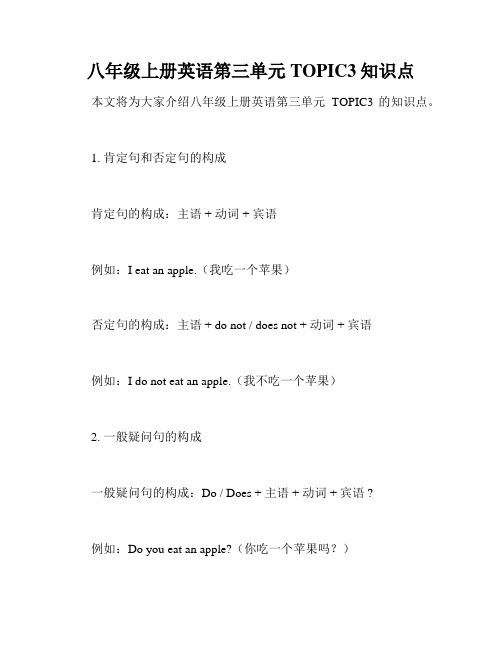
八年级上册英语第三单元TOPIC3知识点本文将为大家介绍八年级上册英语第三单元TOPIC3的知识点。
1. 肯定句和否定句的构成肯定句的构成:主语 + 动词 + 宾语例如:I eat an apple.(我吃一个苹果)否定句的构成:主语 + do not / does not + 动词 + 宾语例如:I do not eat an apple.(我不吃一个苹果)2. 一般疑问句的构成一般疑问句的构成:Do / Does + 主语 + 动词 + 宾语 ?例如:Do you eat an apple?(你吃一个苹果吗?)3. 询问时间和地点询问时间的句型:What time is it? / What’s the time?例如:What time is it now?(现在几点了?)询问地点的句型:Where is the school?例如:Where is the school?(学校在哪里?)4. 询问对象和人物的句型询问对象的句型:Who / Whom + 动词 + 宾语 ?例如:Who is your English teacher?(你的英语老师是谁?)询问人物的句型:What + be / do / have + 主语 ?例如:What is your father’s name?(你爸爸叫什么名字?)5. 日常交际用语1) 问候语:Hello,Good morning / afternoon / evening.2) 道别语:Goodbye,See you later,Bye.3) 感谢语:Thank you,Thanks.4) 道歉语:Sorry,Excuse me.6. 数字和时间的表达数字的表达:One,two,three,four,five,six,seven,eight,nine,ten.时间的表达:例如:7:00(seven o’clock),7:05(five past seven),7:10(ten past seven),7:15(quarter past seven),7:20(twenty pastseven),7:25(twenty-five past seven),7:30(half past seven),7:35(twenty-five to eight),7:40(twenty to eight),7:45(quarter to eight),7:50(ten to eight),7:55(five to eight)。
仁爱版英语七年级下册Unit 7 Topic 3《Everyone had a good time》
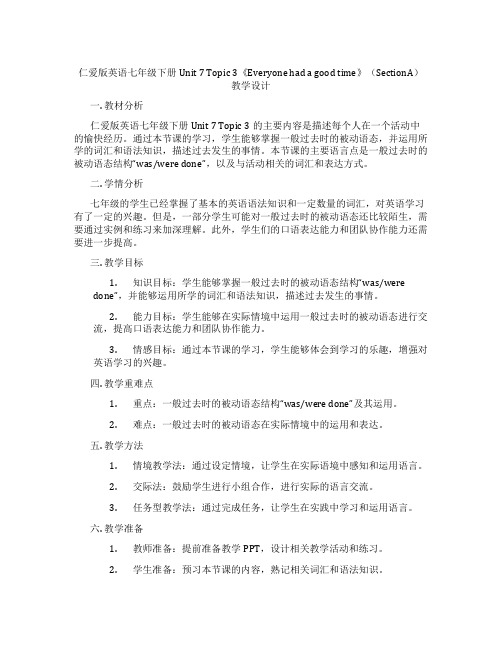
仁爱版英语七年级下册Unit 7 Topic 3《Everyone had a good time》(SectionA)教学设计一. 教材分析仁爱版英语七年级下册Unit 7 Topic 3的主要内容是描述每个人在一个活动中的愉快经历。
通过本节课的学习,学生能够掌握一般过去时的被动语态,并运用所学的词汇和语法知识,描述过去发生的事情。
本节课的主要语言点是一般过去时的被动语态结构“was/were done”,以及与活动相关的词汇和表达方式。
二. 学情分析七年级的学生已经掌握了基本的英语语法知识和一定数量的词汇,对英语学习有了一定的兴趣。
但是,一部分学生可能对一般过去时的被动语态还比较陌生,需要通过实例和练习来加深理解。
此外,学生们的口语表达能力和团队协作能力还需要进一步提高。
三. 教学目标1.知识目标:学生能够掌握一般过去时的被动语态结构“was/weredone”,并能够运用所学的词汇和语法知识,描述过去发生的事情。
2.能力目标:学生能够在实际情境中运用一般过去时的被动语态进行交流,提高口语表达能力和团队协作能力。
3.情感目标:通过本节课的学习,学生能够体会到学习的乐趣,增强对英语学习的兴趣。
四. 教学重难点1.重点:一般过去时的被动语态结构“was/were done”及其运用。
2.难点:一般过去时的被动语态在实际情境中的运用和表达。
五. 教学方法1.情境教学法:通过设定情境,让学生在实际语境中感知和运用语言。
2.交际法:鼓励学生进行小组合作,进行实际的语言交流。
3.任务型教学法:通过完成任务,让学生在实践中学习和运用语言。
六. 教学准备1.教师准备:提前准备教学PPT,设计相关教学活动和练习。
2.学生准备:预习本节课的内容,熟记相关词汇和语法知识。
七. 教学过程1.导入(5分钟)教师通过播放一段孩子们参加活动的视频,引导学生谈论过去发生的事情,自然引入本节课的主题。
2.呈现(10分钟)教师通过PPT展示本节课的主要内容,包括一般过去时的被动语态结构“was/were done”,以及与活动相关的词汇和表达方式。
湘教版-英语-七上-Topic3 What time is it(如何抓住时间)

如何抓住时间时间对于每个人来说都是一样的。
但有些人能够事业有成,一生辉煌。
有些人却一事无成,虚度一生。
现在无论是上班族,还是学生,都在抱怨没时间,不妨读一读下面的文章,或许对你有启发。
Simplify your lifeTwo years ago Shirley Michels of St. Louis found herself getting up earlier and earlier, and going to bed later and later, just to meet everyday demands. The wife, mother and ophthalmic technician met her responsibilities, but lacked time for things that mattered most.She and her husband, Vic, an attorney, began searching for way to simplify their lives. “We had to decide what was really important,” says Shirley. They knew they wanted more time to play with their three-year-old son, Ryan, to exercise and eat right, and to nurture friendships.So the couple chose to live more modestly, shopping with care for necessities and enjoying inexpensive pleasures such as reading, cooking and going to the park. Shirley quit her job and began working part time from home. She printed up business cards that read “At your service---buy yourself a little time,” and hired herself out for personal tasks such as shopping, paying bills, organizing parties, doing Internet research---- whatever clients needed.“I still work hard, but being able to control my hours makes all the difference,” she says. “I can carve out time to take my son to the zoo or get to know neighbo rs not only have been fun, but it’s also helped us further simplify: we all trade offbaby-sitting. For our family less is definitely more!”According to trend watchers, the Michelses are far from alone in wanting to slow down and live a more satisfying life. A Gallup poll found that half all Americans claim they lack enough time to do what they want. Fifty-four percent of parents say they spend too little time with their children, and 47 percent of married couples complain that they lack time together.Where does the time go? For most people, work and commuting dominate the day. According to the Bureau of Labor Statistics, one out of five of us put in 49 or more hours a week on the job; one out of 12 logged 60 hours or more.Then there’s the rich smorgasb ord of modern life ---- so much information to sift through, so many products beckoning. We’re wearing ourselves out trying to have it all.Simplifying means becoming aware of the ways, big and small, that we expend money, time and energy, and then taking steps to curb the waste,. Here, from the experts, are some suggestions for gaining control over life’s hassles in order to have time for pleasure.Short the day RightBefore she applied “the rule,” mornings were a trial for Baltimore teacher Claudia Bowe, mother of Alex, 11 and Clara, nine. “The lids, my husband and I hadto leave every day at exactly 7:45.” Invariable, books would be missing, teacher’s notes remembered. My son isn’t a morning person, so he was dazed and at his worstwhen I needed him to be most efficient. By the time we were off, we were all in bad moods. We had to change our habits.Brown’s rule? Do everything possible the night before to prepare for the next day. For instance, get a coffee maker that can be timed to start brewing when you wake up. Decide what to wear, including belts and socks; check for spots, wrinkles, missing buttons. Children can set the table with bowls, spoons and cereal boxes--- everything but the milk“Provide a list of items kids need for school the next mornin g --- homework, library books lunch money, permission slips ---and have them check them off before getting into bed every night” suggests organizational expert Ann Gambrell.Set anything to be carried out into the world backpacks, dry cleaning --- in front of the door. Always put keys in the same place. Studies show that the average adult spends 16 hours a year searching for lost keys.Declutch Your Home“Every possession you buy requires tending,” says Don Aslett. “Every chair, blouse, stationary bike, candlestick must be dusted, guarded, stored, repaired. Freeing yourself from unnecessary possessions frees up time.”To overcome the hoarder inside screaming: “I may need this, Smith College psychologist Randy 0. Frost advised talking back to yourself.” “I’ll never use this twisted umbrella. New ones cost only six dollars.” Or, “Yes, I may need this leftover wallpaper someday, but am I going to save everything I might need someday? If so, maybe I should rent a warehouse.”San Francisco cleaning expert Jeff Campbell, author of Clutter Control, advised clients drowning in debris----but who seem unable to part with so much as a stray screw ---- to start small. Do one drawer, one shelf, at a time. If it’s broken, fix it or toss it. If it doesn’t fit, alter it or g ive it away.Cultivating just one good habit can prevent clutter from accumulate: don’t put anything down “for now”. Don’t leave jackets on chairs or glasses in the sink “for now”. As mom said, “don’t put it down, put it away” to do otherwise means handin g everything more than once.Don’t Save Pennies and Waste HoursMost of us are taught to watch money, but not value time, say Andrea Van Steenhouse, author of A Woman’s Guide to Simpler Life. “As a result, we may not even think about how much irreplaceable time we waste to save a few pennies.” Is it worth to wander through a giant discount mart, searching for picture hangers, when the neighborhood hardware store owner would point to them immediately? To wait for takeout at the restaurant when delivery is available for tip.Encourage Your Kids to HelpStephanie Culp is a productivity consultant in Temecula, Calif, and author of You Can Find More Time For Yourself Every Day. Her golden rule for families: except for babies, no one is exempt from housework.Be prepared to reduce expectation at first --- a poorly made bed is a lot better than one left unmade. But if the bed making is particularly pathetic, it may be sabotage maneuver. Stick to your gun, says Culp. If you give in, your child, havingsavored the victory of upward delegation, may use the same tactic to get out of other chores.The payoff for all this simplifying? You’ll free up time to do what you love most, whether it’s playing with the kids, gardening or traveling. Nothing could be simple.If you do everything above well, you will find a lot of time.。
Topic 3

Topic3一、重点短语1. go ahead (尤指经某人允许)开始,干下去,走在前面,领先2. do some cleaning3. all the time4. have to5. keep away6. just a moment7. take care of8. care for9. talk with10. Chinese medicine11. ask for leave12. healthy food13. crowded places14. do one`s best15. change clothes often16. wash hands often17. ring------up18. leave a message19. take a message20. call sb. Back21. take an active part in22. what do you think of------ ?23. have a good time=enjoy oneself24. next time 做扫除一直不得不,必须远离-------稍等一会儿照顾照顾(病人);照料和----交谈中药请假健康食物拥挤的地方尽力常换衣服常洗手打电话给--------留口信带口信给------ 回电话积极参加你认为---------怎么样?过得愉快下次25. teach oneself on the Internet 网上自学26. be afraid of sth / doing sth. 害怕----- ,恐惧-------二、重点句型1. Sure,go ahead. 当然可以,请问吧!ahead 意思是向前,这里的go ahead 原意为向前走,在这里译作继续问问题,相当于go on2. Please tell my father to take care of himself 请告诉我爸爸照顾好自己。
新科普版八年级英语上册《Topic 3 What were you doing at this time yesterday. Section C》优质课教案_3

仁爱新课标八年级Unit 3 Topic3 Section C教学设计课题:仁爱新课标八年级Unit 3 Topic3 Section C课型:读写课ⅠObjectives for Teaching. (教学目标)1. Objectives for knowledge. (知识目标)A) 能根据音标拼读并识记一些单词: dark, match, voice, hungry, beat,burn, stove, goose, disappear, flame, dead。
B) 能够正确使用过去进行时。
C) 能用过去进行时讲述发生在过去的事情并能给出自己的看法。
2. Ability Objectives: (能力目标)Cu ltivate the students’ ability by listening, speaking and discussing,and form their study habit of thinking actively.(通过听,说,读以及小组讨论等方式,培养学生积极运用英语思维的良好学习习惯)3. Objectives of Morality. (德育目标)通过阅读通话故事,激发学生同情心的善良品德,让他们懂得珍惜现在的幸福生活。
ⅡImportant Points and Difficult Points in Teaching. (教学重点难点)掌握本课的重点词汇,短语以及过去进行时态。
ⅢThe Ways in Teaching.(教学方法)1. (情景教学法)2.(讨论法)ⅣTeaching Aids ( 教学手段)多媒体Ⅴ. Teaching procedures. (教学过程)。
仁爱版英语 七年级上册 Unit 4 Topic 3 课文及翻译
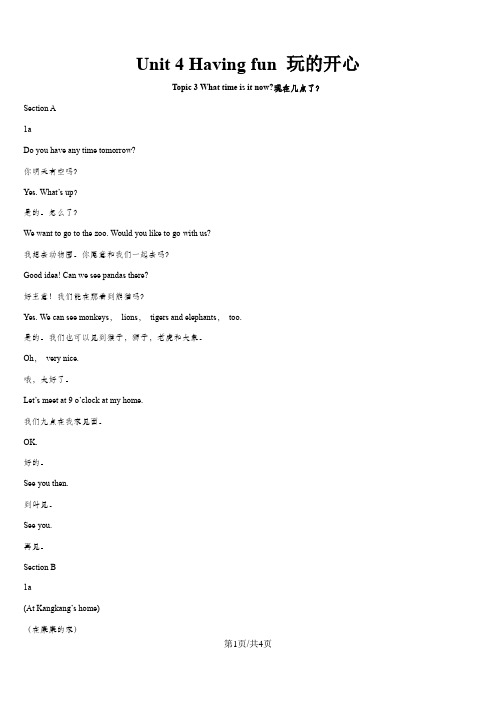
Unit 4 Having fun 玩的开心Topic 3 What time is it now?现在几点了?Section A1aDo you have any time tomorrow?你明天有空吗?Yes. What’s up?是的。
怎么了?We want to go to the zoo. Would you like to go with us?我想去动物园。
你愿意和我们一起去吗?Good idea! Can we see pandas there?好主意!我们能在那看到熊猫吗?Yes. We can see monkeys,lions,tigers and elephants,too.是的。
我们也可以见到猴子,狮子,老虎和大象。
Oh,very nice.哦,太好了。
Let’s meet at 9 o’clock at my home.我们九点在我家见面。
OK.好的。
See you then.到时见。
See you.再见。
Section B1a(At Kangkang’s home)(在康康的家)What time is it now?现在几点了?It’s 9 o’clock.九点。
It’s time to go to the zoo.去动物园的时间到了。
OK.Let’s go.好的。
让我们出发吧。
(At zoo)(在动物园)Look at those monkeys. They’re so clever. I like them very much.看看那些猴子。
他们太聪明了。
我非常喜欢它们。
I like pandas. They are cute. What are your favorite animals,Jane?我喜欢熊猫。
它们很可爱。
简,你最喜欢的动物是什么?Elephants. They’re so kind and they have long noses. What about you,Maria?大象。
八年级上册Unit 1 topic 3 知识点总 结

八年级上册Unit 1 topic 3The school sports meet is coming.一.重要知识点总结:Section A1. The school sports meet is coming. will you take part in it?学校的运动会马上就要来了,你准备参加吗?(1)sports meet 运动会;名词作定语修饰名词时,一般用单数形式,但woman, sport作定语时通常用复数形式;e.g. women teachers sports shoes(2)be + 短暂性动词现在进行时态表示即将发生的动作,类似的短暂性动词:go, come, fly, start, leave等;e.g. What time are you starting? 你们什么时候出发?2. Which sport will you take part in?你将要参加哪一项运动?(1) take part in + 活动参加....... ;take part in = be in = join in ;我将参加接力赛。
I will take part in the relay race.= I will join in the relay race.= I will be in the relay race.3. The boys’ 800-meter race男子800米赛跑。
(1)800-meter = 800 meters(2)15-year-old “15岁的” 15 years old “15岁”e.g. He is a 15-year-old boy. = The boy is 15 years old.4.I’ll be in the long jump and the high jump.我将会参加跳远和跳高。
take part in = be in = join in 参加 + 活动;5.I believe you will win.我相信你会赢的。
八年级英语仁爱版上册Unit3_Topic3_课时同步练(原卷版)

第三单元第3课一、基础巩固Ⅰ.单项选择。
1. I _______ a museum with my friends at this time yesterday.A. am visitingB. was visitingC. visitedD. will visit2. He is _______ small _______ to school.A. too; to goB. can’t; goC. too; goD. so; to go3. Many people read newspapers on the train to _______ the time in Britain.A. saveB. wasteC. passD. take4. It was raining hard _______ I got up this morning.A. ifB. whenC. afterD. until5. —Look! The girl is playing with a snake.—How _______ she is!A. braveB. happyC. strongD. excited6. The old man died _______ a cold snowy night.A. inB. onC. atD. over7. —You look very sad. What’s wrong?—It’s OK. There is _______.A. something seriousB. serious somethingC. nothing seriousD. serious nothing8. “Now I told you a secret,”he said to me _______ a low voice.A. withB. atC. inD. use9. —Which team _______ the match, Team One or Team Two?—Team One _______ Team Two.A. won; wonB. beat; beatC. beat; wonD. won; beat10. I feel tired, but I don’t want to stop _______.A. workB. to workC. worksD. working二、拓展提升Ⅱ. 情景交际。
Unit 4 Topic 3 单元课时练习题仁爱版七年级英语上册

仁爱版七年级英语上册单元课时练习题Unit 4 Having funTopic 3 What time is it now?Section A一、根据句意及首字母提示补全单词。
1. Look at the e__________. It has a long nose and big ears.2. —It’s a big animal and it looks like a black and yellow cat. —I see. It’s a t__________3. —What time is it, Mike?—Oh, it’s a q__________ to eight. We have to go to school now.4. H__________ of the students in my class are boys.5. —Bob, do you like p__________?—Yes, I like them very much. They’re from Sichuan. Look! They look very cute.二、从方框中选择适当的句子补全对话。
A: Danny, do you have any time next Sunday?B: 1 What’s up?A: I want to visit my grandparents and they have a big farm. 2B: Yes, I’d love to. Can we eat oranges there? 3A: Sure. You can eat apples and bananas, too.B: That’s very nice. 4A: Let’s meet at eight o’clock at my home. B: OK.A: 5B: See you.A. Would you like to go with me?B. When and where will we meet?C. Yes, I am free that day.D. See you then.E. I like oranges very much.参考答案一、1. elephant2. tiger3. quarter4. Half5. pandas二、1. C2. A3. E4. B5. DSection B一、根据句意和首字母提示补全单词。
仁爱版英语八年级下册Unit6 Topic3 教材知识详解
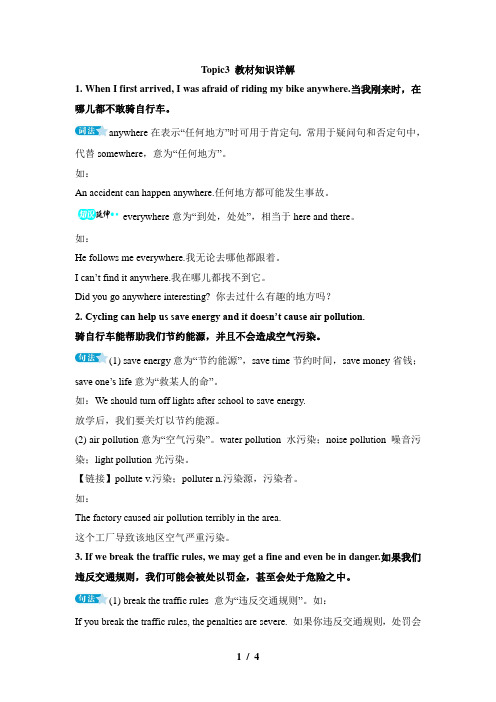
Topic3 教材知识详解1. When I first arrived, I was afraid of riding my bike anywhere.当我刚来时,在哪儿都不敢骑自行车。
anywhere在表示“任何地方”时可用于肯定句。
常用于疑问句和否定句中,代替somewhere,意为“任何地方”。
如:An accident can happen anywhere.任何地方都可能发生事故。
everywhere意为“到处,处处”,相当于here and there。
如:He follows me everywhere.我无论去哪他都跟着。
I can’t find it anywhere.我在哪儿都找不到它。
Did you go anywhere interesting? 你去过什么有趣的地方吗?2.Cycling can help us save energy and it doesn’t cause air pollution.骑自行车能帮助我们节约能源,并且不会造成空气污染。
(1) save energy意为“节约能源”,save time节约时间,save money省钱;save one’s life意为“救某人的命”。
如:We should turn off lights after school to save energy.放学后,我们要关灯以节约能源。
(2) air pollution意为“空气污染”。
water pollution 水污染;noise pollution 噪音污染;light pollution光污染。
【链接】pollute v.污染;polluter n.污染源,污染者。
如:The factory caused air pollution terribly in the area.这个工厂导致该地区空气严重污染。
3. If we break the traffic rules, we may get a fine and even be in danger.如果我们违反交通规则,我们可能会被处以罚金,甚至会处于危险之中。
欧美商务风企业推介模板PPT

TOPIC HEADER HEREWe have many PowerPoint templates that has been specifically designed to help anyone that is stepping into the world of PowerPoint for the very first time.
2013
HEADER TOPIC HERE
We have many PowerPoint templates that has been specifically designed.
2014
HEADER TOPIC HERE
We have many PowerPoint templates that has been specifically designed.
专业团队
This is a subtitle for your presentation
●企业推介 ●项目展示 ●计划总结 ●商业融资
YOURLOGO
欢迎辞
This is a subtitle for your presentation
WELCOME MESSAGE
We have many PowerPoint templates that has been specifically designed to help anyone that is stepping into the world of PowerPoint for the very first time. We have many PowerPoint templates that has been specifically designed to help anyone that is stepping into the world of PowerPoint for the very first time. We have many PowerPoint templates that has been specifically designed to help anyone that is stepping into the world of PowerPoint for the very first time.
七年级英语上册《unit 4 having fun》topic 3 what time is it now练习(含解析) (新版)仁爱版

《Unit 4 Having Fun》Topic 3 What time is it now练习(满分100分时间90分钟)第一部分听力 (20分)Ⅰ.听句子,选择正确图片。
每个句子读两遍。
(5分)A. B. C. D. E.1.____2.____3.____4.____5.____Ⅱ.听句子,选择正确答语。
每个句子读两遍。
(5分)( )6. A. Sunday. B. A quarter to five. C. Afternoon.( )7. A. Elephants. B. Monkeys. C. Pandas.( )8. A. No, I can do it. B. It’s very kind of you. C. Yes, please do.( )9. A. Tigers. B. Elephants. C. Pandas.( )10. A. They’re clever. B. They’re strong. C. They’re kind.Ⅲ.听对话及问题,选择正确答案。
每组对话和问题读两遍。
(5分)( )11. A. 5:45. B. 6:15. C. 6:55.( )12. A. Cats. B. Monkeys. C. Lions.( )13. A. Yes, he does. B. No, he doesn’t. C. Yes, he is. ( )14. A. Tigers and elephants. B. Elephants. C. Tigers. ( )15. A. The woman. B. The little girl. C. The little boy.Ⅳ.听短文,判断下列句子的正(T)误(F)。
短文读两遍。
(5分)( )16. I get up at 6:30.( )17. My father goes to work at ten to eight.( )18. Our English teacher gives us classes in the morning.( )19. Jim plays at 5:20 in the afternoon.( )20. We go home at 6: 15.第二部分基础知识运用 (55分)Ⅰ.单项选择。
仁爱英语七年级上册Unit4-topic3知识点讲解及随堂练习

知识点梳理一、词组与短语:1.go to the zoo 去动物园2.like something best 最喜欢谋事3.See you next time. 下次见4.have lunch 吃午饭5.have sports 进行体育运动6.go to bed 去睡觉7.go home 回家8.go to school 上学9.start school 开始上课10.watch TV 看电视11.get up 起床12.do one`s homework 做作业13.in the morning"afternoon"evening 在早上"下午"晚上14.find one’s way home找到回家的路15.It’s time to do sth.该是做某事的时候二、重点句型:1.What animal do you like best?=What`s your favorite animal?2.What time is it?=What`s the time?=Could you tell me the time?3.It`s time to do something.4.What`s wrong with you?=What`s up?=What`s the matter with you?5.Don`t cry.6.It`s very kind of you to help us.7.Here we are.三、语法:时刻表达法1:00 one o`clock1:05 one--o--five five past one 1:15 one fifteen a quarter past one 1:30 one thirty half past one1:40 one forty twenty to two 1:45 one forty-five a quarter to two 例题讲解一、用所给单词的适当形式填空1. Her idea ______ (sound) great.2. Some animals are very _______ (friend) to people.3. Which do you like _______ (well), a cat, a dog or a pig?4. There are lots of _______ (horse) on the farm.5. Can you see those _______ (monkey) in the zoo?二、单项选择6. _______ Sunday, some people come to the zoo.A. InB. OnC. At7. There is _______ elephant in the zoo.A. aB. anC. the8. I don’t like lions _______ elephants at all.A. orB. andC. so9. _______ you free tomorrow morning?A. CanB. AreC. Do10. I like tigers very much. _______ you?A. What areB. Which areC. How about三、句型转换11. I’ll have some time then. (改为一般疑问句)_______ you _______ _______ time then?12. Are the elephants so big? (作否定回答)No, _______ _______.13. I like pandas best. (对划线部分提问)_______ _______ _______ you like best?14. I can see only one lion in the picture. (对划线部分提问)_______ _______ _______ can you see in the picture? 15. His favorite animals are cats. (改为同义句)He _______ cats _______.四、用所给动词的适当形式填空16. Would you like ______ (go) to the zoo with us?17. Can I ______ (give) the food to the animals?18. My mother often ______ (take) me to the zoo on Sundays.19. What _______ (be) your favorite animals?20. Let’s _______ (drive) to the zoo this afternoon.当堂练习A:一、单项选择1. Mike watch is here. Please _______.A. give him itB. give it to himC. to give it to him2. —_______? —It’s nine.A. Where is my watchB. Whose is this watchC. What’s the time3. —Can you tell me the time? —_______.A. Yes, I can’tB. No, I canC. No, I can’t4. Is it time _______ to bed?A. goB. to goC. going5. I’m sorry. I have ______ watch.A. noB. not anyC. not二、句型转换6. She has a new watch. (改为复数句)They _______ some new _______.7. It’s twelve o’clock now. (对划线部分提问)_______ the _______ now?8. It’s ten thirty.(改为同义句)It’s _______ _______ _______.9. It’s time for lunch. (改为同义句)It’s time _______ _______ lunch.10. Do you often get up at five forty?(改为同义句)Do you often get up at _______ _______ _______?三、补全对话选择正确的句子完成对话,有两项剩余Tom: Look! A nn! What’s under the desk?Ann: It’s a watch. It’s a black one.Tom: (11) _______Ann: Yes, is it yours?Tom: No, mine is old. (12) _______Ann: It looks like Bob’s.Tom: Look, he is under the tree.Ann: (13) _______Tom: Excuse me, Bob. What’s the time?Bob:Oh, sorry. I don’t know. I can’t find my watch? Ann: Your watch? Is it your watch?Bob:Let me see. Yes, it’s mine. Where is it? Ann: (14) _______Tom: Here you are.Bob: Thanks a lot.Tom: (15) _______B:一、根据句意及首字母提示填写正确的单词1. There are many a_______ in the zoo.2. I can’t find my w_______ home.3. Monkeys like e_______ bananas.4. T he tiger is in B_______ Monkey’s home.5. It is very c_______. It only lives in China.二、单项选择6. She can’t find her way _______.A. homeB. to homeC. at home7. —What’s the time?—It’s _______.A. thirty-five to tenB. eleven a quarterC. twenty past nine8. I’m afraid I may be _______ late.A. a fewB. a littleC. little9. All the teachers are friendly. We love _______ very much.A. herB. theyC. them10. It’s very kind _______ you to help me.A. ofB. forC. with三、句型转换11. It lives with us. (改为一般疑问句,并作否定回答)_______ it _______ with us? No, it _______.12. That is Tom’s home.(对划线部分提问)_______ home _______ that?13. The new zoo is over there.(对划线部分提问)_______ _______ the new zoo?14. We usually have supper at about six forty-five.We usually have supper at about _______ _______ _______ seven.15. You help us. You are very kind.(合并成一个句子)_______ kind _______ you _______ _______ us.四、用适当的句子完成对话16. —I’m sorry I can’t help you.—_______________.17. —_______________. Could you tell me the time, please?—It’s eight twenty.18. —I like lions very much. _______________?—I like monkeys.19. —Let’s go to the zoo tomorrow.—_______________.20. —_______________ the shirt?—It’s eighty yuan.五、作业题一、单项选择1. —Would you like to play with us?—_______, but I have no time.A. I’d likeB. I likeC. I’d like to2. _______ late. We must leave now.A. Don’tB. Don’t beC. Can’t be3. It’s Sunday today. Why not _______?A. to go to the zooB. watch TV at homeC. flying a kite4. I don’t like the shirt. Please give me _______ one.A. anyB. someC. another5. There are _______ tigers in the zoo. Would you like to see them this afternoon?A. a fewB. anyC. few6. May I ask you _______ questions?A. aB. anyC. some7. There is a watch on the floor (地板). Please _______.A. pick up itB. pick it upC. pick one up8. Does your sister get up _______ six o’clock _______ the morning?A. in, onB. at, inC. at, on9. I can’t _______ my ruler.A. findB. findsC. finding10. —Thank you very much. —_______.A. All rightB. Not at all.C. Thank you all the same二、完成句子,每空一词11. 你怎么了,罗伯特?_______ _______ _______ you, Robert?12. 谢谢你帮助了我。
最新仁爱英语八年级上册 Unit1.topic3知识点归纳
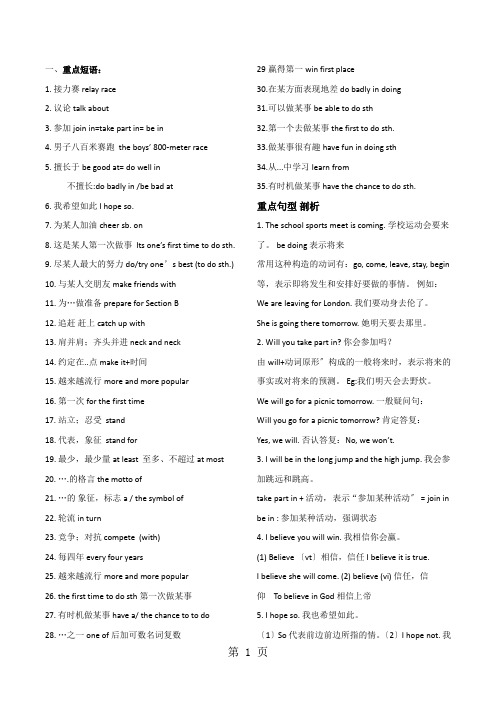
一、重点短语:1. 接力赛 relay race2. 议论 talk about3. 参加 join in=take part in= be in4. 男子八百米赛跑 the boys’ 800-meter race5. 擅长于 be good at= do well in不擅长:do badly in /be bad at6. 我希望如此 I hope so.7. 为某人加油 cheer sb. on8. 这是某人第一次做事 Its one’s first time to do sth.9. 尽某人最大的努力 do/try one’s best (to do sth.)10. 与某人交朋友 make friends with11. 为…做准备 prepare for Section B12. 追赶赶上catch up with13. 肩并肩;齐头并进 neck and neck14. 约定在..点 make it+时间15. 越来越流行more and more popular16. 第一次for the first time17. 站立;忍受 stand18. 代表,象征 stand for19. 最少,最少量at least 至多、不超过at most20. ….的格言 the motto of21. …的象征,标志a / the symbol of22. 轮流 in turn23. 竞争;对抗 compete (with)24. 每四年 every four years25. 越来越流行more and more popular26. the first time to do sth第一次做某事27. 有时机做某事 have a/ the chance to to do28. …之一 one of 后加可数名词复数29赢得第一win first place30.在某方面表现地差 do badly in doing31.可以做某事 be able to do sth32.第一个去做某事 the first to do sth.33.做某事很有趣have fun in doing sth34.从...中学习learn from35.有时机做某事 have the chance to do sth.重点句型剖析1. The school sports meet is coming. 学校运动会要来了。
仁爱版七年级英语上册Unit4Topic3WhattimeisitnowA优质教案
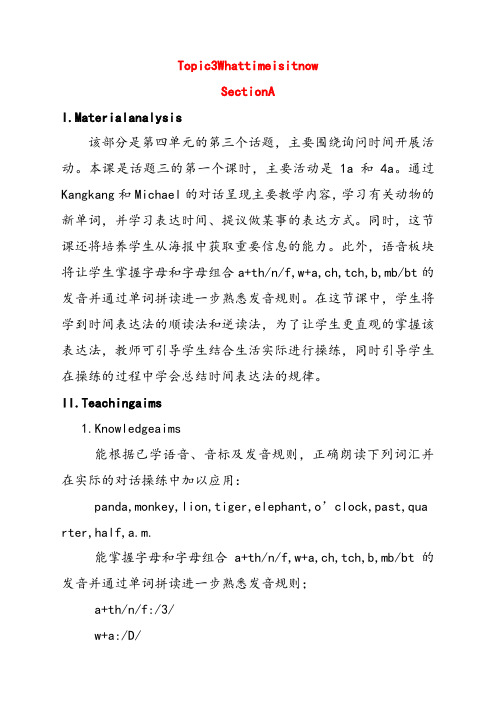
Topic3WhattimeisitnowSectionAI.Materialanalysis该部分是第四单元的第三个话题,主要围绕询问时间开展活动。
本课是话题三的第一个课时,主要活动是1a和4a。
通过Kangkang和Michael的对话呈现主要教学内容,学习有关动物的新单词,并学习表达时间、提议做某事的表达方式。
同时,这节课还将培养学生从海报中获取重要信息的能力。
此外,语音板块将让学生掌握字母和字母组合a+th/n/f,w+a,ch,tch,b,mb/bt的发音并通过单词拼读进一步熟悉发音规则。
在这节课中,学生将学到时间表达法的顺读法和逆读法,为了让学生更直观的掌握该表达法,教师可引导学生结合生活实际进行操练,同时引导学生在操练的过程中学会总结时间表达法的规律。
II.Teachingaims1.Knowledgeaims能根据已学语音、音标及发音规则,正确朗读下列词汇并在实际的对话操练中加以应用:panda,monkey,lion,tiger,elephant,o’clock,past,qua rter,half,a.m.能掌握字母和字母组合a+th/n/f,w+a,ch,tch,b,mb/bt的发音并通过单词拼读进一步熟悉发音规则;a+th/n/f:/3/w+a:/D/ch:/C/tch:/C/b:/b/mb/bt:silent“b”能正确使用表示时间的方式,如:past,to,half等;能就询问时间、时间表达、提建议等表达法进行交流与对话操练,如:Doyouhaveanytimetomorrow?Let’smeetat9o’clockatmyhome.Whattimeisit,please?What’sthetime,please?It’soneo’clock.It’sfivepasttwo.It’saquarterpastthree.It’stwenty-threetosix.It’saquartertoeight.2.Skillaims能听懂描述及询问时间的表达,能听懂简单的课堂用语并做出适当的反应;能使用问答时间的句型进行简单的交流;能在教师的指导下进行简单的角色表演、仿编对话等;能正确朗读打电话的对话,并注意语音语调;能正确书写单词,并能正确使用单词造句。
- 1、下载文档前请自行甄别文档内容的完整性,平台不提供额外的编辑、内容补充、找答案等附加服务。
- 2、"仅部分预览"的文档,不可在线预览部分如存在完整性等问题,可反馈申请退款(可完整预览的文档不适用该条件!)。
- 3、如文档侵犯您的权益,请联系客服反馈,我们会尽快为您处理(人工客服工作时间:9:00-18:30)。
rice beer tea cola money
事 课 电影 面包 啤酒
Shi Ke Dianying Mianbao pijiu
Affair Class Movie Bread beer
明天 上午 下午 晚上 星期六
yíɡè miàn bāo liǎnɡ pí píjiǔ nɡ sān bēi chá yíwèi lǎo shī
Time
Daily Chinese
Pinyin
New words
今天
Key sentences
哪位 nawèi/ něiwèi Who’s that?
是我,Mike。
Shi wǒ, Mike. It’s me, Mike.
她是谁? mǐ fàn 谁是Mike? píjiǔ 谁吃面包? chá kě lè qián
Activity
• You want to go to the bar tonight with your friend, make a phone call to invite him/her. using the following words.
喂,哪位? ……有时间吗? 有事吗? 你想……吗? 什么时候? 在哪儿?
tián 去 Là 吃饭 看电影 suān xián xiāng
sweet hot sour salty nice smell
我19:00来。
Wo wanshang qidian lai. I; place + affair
我八点半在酒吧等你。
Wo wanshang qidian lai. I’m waiting in the bar at 20:30.
七十(块) 八十六块三(毛) 十二块九毛八(分)
你在学校吗? Nizaixuexiaoma? Are you in school?
mǐ fàn 家 píjiǔ 酒吧 看电影 chá kě lè qián
rice beer tea cola money
你哪儿? Nizainar? Where are you?
a bread two bottles of beer three cups of tea a teacher
mǐ fàn 吃饭 píjiǔ 喝酒 看电影 chá kě lè qián
rice beer tea cola money
我想……/我不想……,谢谢。
yào … / bú yào , xiè xiè 。 Yes… / no, thanks.
几点?
jidian? What time is it?
19:30。
Wanshang qidian ban. 晚上七点半
6:00 早上六点 9:05 上午九点零五分 12:10 中午十二点十分 14:15 下午两点十五分/两点一刻 20:45 晚上八点四十五分/八点一刻 22:55 晚上十二点五十五分/十一点差五分
